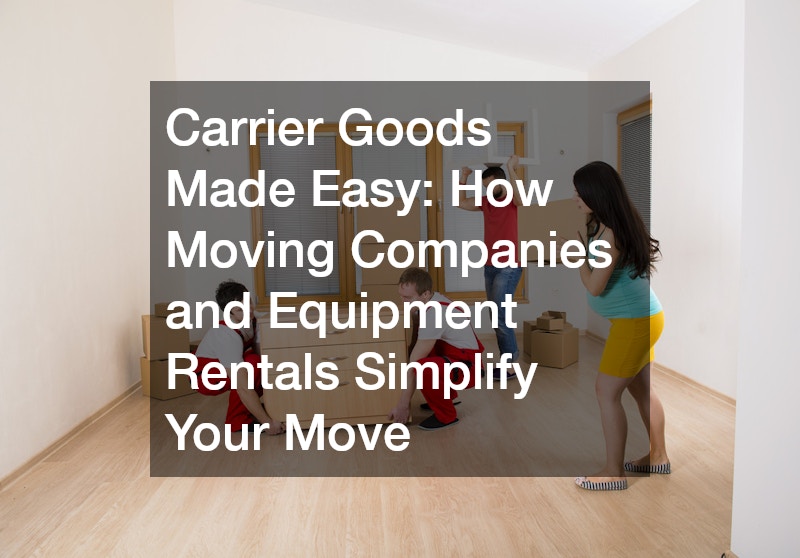Relocating a home or business can be a stressful process, especially when handling valuable, bulky, or fragile items. Carrier goods, which include everything from furniture to electronics, require careful management to ensure they arrive safely at their destination. Moving companies and equipment rentals have revolutionized the relocation process by providing specialized solutions to transport these goods efficiently. From hiring furniture movers to utilizing shipping container hire or driveway-based storage, professional moving services offer flexibility, security, and peace of mind. By understanding how carrier goods are managed, homeowners and business owners can plan their moves more effectively, save time, and reduce the risk of damage.

What are Carrier Goods and Why Do They Matter?
Carrier goods refer to items that require careful handling during transit due to their size, value, or fragility. These can include furniture, appliances, electronics, artwork, or any item that cannot be easily carried by hand. Unlike regular goods, carrier goods often need specialized equipment, protective packing materials, or professional handling to prevent damage during a move. For example, heavy furniture or large electronics might require dollies, straps, or even shipping containers to ensure safe transportation.
The importance of carrier goods in the moving process cannot be overstated. Mishandling these items can result in costly repairs, replacement expenses, or damage to the property itself. Moving companies trained in handling carrier goods understand the unique challenges involved, from balancing weight distribution in trucks to securing items in transit. Differentiating between carrier goods and everyday items ensures that critical or high-value possessions are given the attention and equipment they require, making the entire relocation smoother and safer.
Recognizing carrier goods early in your move also allows for better planning. It influences decisions like hiring furniture movers versus using a local moving company for smaller tasks, selecting equipment rental options, and determining whether shipping container hire is necessary for temporary storage. Proper categorization streamlines packing, transportation, and unpacking, saving both time and resources during the move.
How Do Moving Companies Utilize Carrier Goods?
Professional moving companies have refined processes for handling carrier goods to ensure efficiency and security. These services often include full packing, loading, transportation, and unloading, allowing clients to focus on other aspects of their relocation. By using trained furniture movers and specialized equipment, moving companies reduce the risk of injury or damage, providing a comprehensive solution for high-value or bulky items.
One major advantage of professional moving services is their ability to manage logistics. Moving companies coordinate everything from driveway pickups to the careful placement of items in storage units or shipping containers. They account for dimensions, weight limits, and potential hazards, which helps prevent delays or accidents. Whether relocating a single apartment, a rental property, or an entire office, these experts streamline the move with tailored solutions for carrier goods.
Additionally, moving companies can customize services to meet specific client needs. They may provide stain removers for upholstery, padding for delicate surfaces, or temperature-controlled storage options for sensitive electronics. By leveraging equipment rental and specialized labor, moving services ensure that every item, no matter its size or fragility, reaches its destination safely and efficiently.
What Equipment Rentals are Available for Moving Carrier Goods?
Equipment rentals play a crucial role in moving carrier goods, especially for items that are heavy, bulky, or difficult to maneuver. Dollies, lifting straps, hand trucks, and moving carts reduce physical strain and prevent damage to furniture or floors. Many moving companies include access to this equipment as part of their service, but individuals handling a DIY move can rent gear to ensure safe handling.
Beyond basic tools, shipping container hire has become an increasingly popular solution. Containers allow homeowners to store furniture and large items securely on-site or at a rental facility. Using containers can reduce multiple trips to storage units, minimize handling, and provide flexible access throughout the move. This is particularly useful for rental property moves or when driveway space is limited, as containers can be temporarily stationed for convenient loading and unloading.
Choosing the right equipment requires assessing the type and quantity of carrier goods. Heavy-duty dollies and specialized lifting straps are essential for large furniture, while protective blankets and crates safeguard fragile items. By renting equipment from reputable suppliers, moving services or DIY movers can significantly reduce risk, improve efficiency, and ensure that carrier goods are transported in a secure and organized manner.

When Should You Consider Professional Moving Services?
Deciding whether to hire a local moving company or handle a move independently depends on several factors, including the scope of the relocation, budget, and personal circumstances. Professional movers provide substantial advantages for complex moves, particularly when carrier goods are involved. These services are ideal for homes with multiple floors, tight driveway access, or large items that cannot be safely lifted without equipment.
A cost-benefit analysis often reveals that investing in movers saves both time and potential damage expenses. DIY moves may appear cheaper upfront, but the risks to furniture, electronics, and even flooring can outweigh initial savings. Professional moving services offer trained personnel, equipment rental, and secure transport for high-value items, making them a practical choice for families or businesses relocating sensitive goods.
Personal circumstances should also guide the decision. Busy professionals, individuals with mobility constraints, or legal practitioners moving offices benefit from the convenience of a top moving service. For example, local personal injury attorneys or law offices relocating sensitive files might find that outsourcing the move to specialized movers ensures confidentiality and efficiency, reducing stress and minimizing disruption to ongoing work.
What Safety Measures Are Involved in Moving Carrier Goods?
Safety is paramount when transporting carrier goods. Moving companies employ a combination of physical safeguards, protocols, and insurance options to protect both items and personnel. Proper packing using padding, moving blankets, and secure strapping prevents scratches, dents, and breakage. For fragile items, custom crates or protective covers are often used to mitigate risk.
Risk management extends beyond packing. Furniture movers follow strict loading and unloading procedures, ensuring weight is evenly distributed in trucks or shipping containers. Equipment rental tools, such as dollies and lifting straps, are designed to reduce strain and prevent accidents during lifting. Professional movers are trained in ergonomic techniques to safeguard workers and preserve the integrity of carrier goods throughout the journey.
Insurance coverage is an additional layer of protection. Many moving services include liability insurance or offer optional coverage to safeguard valuable possessions during transit. Rental agreements for equipment or shipping containers often specify responsibilities, and understanding these terms is crucial for protecting both property and investment. By adhering to these safety measures, moving companies and individuals can minimize risk while maintaining efficiency.
How to Choose the Right Moving Company for Carrier Goods?
Selecting the right moving company ensures a smooth relocation, particularly when carrier goods are involved. Begin by researching the company’s reputation, certifications, and years of experience. A company familiar with furniture movers, equipment rental, and shipping container hire is better prepared to handle diverse items safely and efficiently.
Comparing pricing and services is essential. Some moving services charge by weight, while others offer flat rates or hourly pricing. Evaluating these options alongside the scope of services—packing, driveway loading, container delivery—helps clients identify the best fit. Hidden fees, such as fuel surcharges or equipment rental costs, should be clarified before finalizing an agreement.
Customer reviews and testimonials provide real-world insight into performance. Satisfied clients often highlight punctuality, professionalism, and the careful handling of carrier goods. For individuals moving to or from rental properties or managing a large inventory of furniture and electronics, selecting a reputable local moving company ensures reliability and accountability throughout the process.

What Are the Hidden Costs Involved in Using Carrier Goods?
While hiring a moving service simplifies logistics, understanding potential hidden costs is crucial. Some moving companies charge additional fees for oversized items, extended driveway access, or special equipment use. Shipping container hire or specialized equipment rental may also incur separate charges if the duration of use extends beyond the initial estimate.
Other extra costs may include stain removers for upholstery, protective padding, or labor for assembly and disassembly of furniture. For moves involving rental properties, additional considerations include elevator fees or storage unit access charges. Planning ahead and obtaining detailed quotes helps avoid unexpected expenses and ensures that carrier goods are transported efficiently without breaking the budget.
Strategies to minimize costs include comparing multiple moving services, bundling equipment rental with professional movers, and avoiding last-minute scheduling. Clear communication about the types and quantities of carrier goods, along with any special requirements, allows moving companies to provide accurate pricing and avoid surprise charges on moving day.
How to Properly Pack Carrier Goods for Your Move?
Packing carrier goods requires careful planning and the right materials. Heavy items like furniture should be wrapped with moving blankets and secured with straps to prevent shifting. Fragile items such as electronics or decorative pieces benefit from bubble wrap, padded boxes, and custom crates.
Essential packing materials include sturdy boxes, reinforced tape, and protective covers to safeguard against dust, moisture, and impact. Labeling boxes clearly allows movers or individuals to quickly identify contents and handle items appropriately. Organizing packing by room or category also facilitates efficient loading and unloading at the destination.
Ensuring secure transportation involves proper weight distribution in trucks or shipping containers. Furniture movers and moving companies often use tie-downs, padding, and professional stacking techniques to reduce movement during transit. By combining meticulous packing with the right equipment rental tools, carrier goods reach their destination intact and ready for setup.
Can Moving Companies Provide Customized Services for Carrier Goods?
Many moving services offer customization options to address specific needs. Clients may request specialized packaging, fragile-item handling, or delivery to tight or restricted spaces, such as narrow driveways or upper-floor apartments. These tailored services enhance efficiency and reduce the risk of damage.
Assessing special needs is critical for fragile or valuable items. Moving companies may provide extra padding, climate-controlled storage, or monitored shipping containers to maintain optimal conditions during transit. Furniture movers can also disassemble and reassemble bulky items to fit tight spaces or shipping vehicles.
Tailoring services to fit schedules ensures minimal disruption. Flexible delivery times, staggered pickups, or temporary on-site container storage accommodate client availability. Professional movers coordinate these details to simplify the relocation process, ensuring carrier goods are handled with care and efficiency from start to finish.

What Role Does Technology Play in Carrier Goods Management?
Technology has transformed how carrier goods are tracked, managed, and secured. Moving companies increasingly use inventory management software to log items, monitor their location, and provide real-time updates to clients. This transparency improves accountability and confidence during moves.
Online platforms allow customers to schedule services, book equipment rental, and communicate directly with furniture movers. Some advanced systems even enable digital walkthroughs to estimate packing needs and suggest the right size shipping containers, ensuring precise planning.
Innovations in tracking and security, such as GPS-enabled trucks or tamper-proof locks, enhance the safety of carrier goods during transit. These tools reduce the likelihood of lost or damaged items while offering clients peace of mind. For individuals handling large-scale moves or rental property transitions, technology provides an added layer of organization and protection.
Conclusion
Managing carrier goods during a move can be complex, but moving companies and equipment rentals simplify the process substantially. From driveway pickups and shipping container hire to furniture movers and professional packing, every element is designed to safeguard items, streamline logistics, and reduce stress. By understanding the value of specialized equipment, professional services, and technology, homeowners and businesses can ensure a smooth, efficient relocation.
Whether moving to a new rental property, upgrading furniture, or relocating valuable electronics, leveraging professional movers and rental solutions helps protect carrier goods and maximize efficiency. Transparent pricing, comprehensive safety measures, and tailored services provide peace of mind for clients handling large or sensitive items. Integrating these strategies into a moving plan ensures that every step—from packing and loading to transportation and unpacking—is managed professionally and securely.
Ultimately, carrier goods management is about combining planning, technology, and expertise to achieve a successful move. With the right moving company, equipment rental solutions, and careful preparation, relocation becomes less stressful and more organized. Homeowners and businesses alike can focus on settling into their new spaces, confident that their valuable possessions are handled with care, precision, and efficiency.
